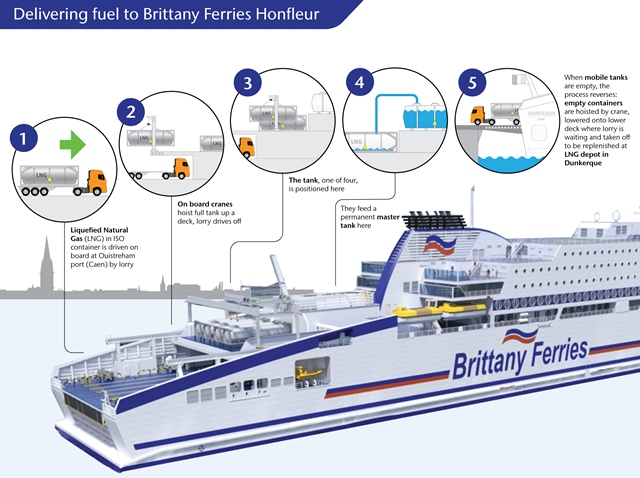No greener fuel storage in ports? No problem for Brittany Ferries’ LNG powered ferry
Brittany Ferries is setting sail for a sustainable future, led by an LNG-powered ferry called Honfleur. To be delivered in 2019, she will come with an innovative fuel delivery and storage system to help navigate a way around the absence of LNG storage in ports. In doing so Honfleur will address a question common to companies throughout the transport sector: can you deliver a vehicle powered by a cleaner fuel without the refuelling infrastructure?
When delivered Honfleur will be the first passenger ship in the world to be equipped with on board cranes that allow 40 feet (ISO standard) LNG containers to be lifted into a fixed position.
These containers will be transported by truck to Ouistreham (Caen) from an LNG terminal at Dunkerque. Driven on board, they will be hoisted into position alongside a fixed LNG storage tank located at the rear of the superstructure. Upon the next call at port, empty containers will be returned to waiting trucks by crane and replenished with full units. See YouTube for animation.
Power delivery will also be a step forward in fuel efficiency. Honfleur’s four main engines will feed electric generators and two electric shaft propulsion motors with two fixed pitch efficient propellers. This is a standard known by the collective name “diesel-electric-propulsion” – and is a configuration applied extensively on large cruise vessels. As well as optimising fuel consumption at reduced speeds, passengers will hear less noise and feel little vibration, making the voyage a more comfortable and enjoyable experience.
“Refuelling infrastructure is key to the uptake of cleaner fuels like LNG, throughout the transport sector,” said Christophe Mathieu, Brittany Ferries CEO. “But we cannot wait for widespread storage in ports to deliver the next generation of cleaner vessels. Our team has addressed this problem in an innovative way and combined it with more efficient power delivery. For this reason, I believe Honfleur will be the most environmentally friendly ship regularly operating in the Channel upon delivery in 2019.”
Compared with diesel fuel, LNG emits less carbon dioxide during combustion and burns with no smoke. It is entirely free of sulphur and produces very low emissions of nitrogen oxide and particulate matter.
Honfleur will carry up to 1,680 passengers and will come with 257 cabins, two cinemas, restaurants, boutique shopping and expansive passenger lounges. She will operate alongside Brittany Ferries’ Mont St Michel on three daily return sailings. Construction begins at the Flensburger Schiffbau shipyard in Germany in February 2018.
Ends
About Brittany Ferries
Brittany Ferries is a passenger car and freight service operating from eleven ports, linking four countries: UK – France, UK – Spain and Ireland – France. The company was set up by a collective of French farmers as a freight-only operator, running from Roscoff in Brittany to Plymouth with the first crossing taking place on 1 January 1973, the date the United Kingdom joined the EEC (forerunner to the EU).
The aim then was to bring French agricultural products to a wider British market. However, the service quickly developed into an operation carrying hundreds of thousands of British tourists, eager to experience the delights of Brittany and Normandy. Today Brittany Ferries is the market leader on the Western Channel for passengers and for freight. It is also a leading supplier of ferry-inclusive motoring holidays to France and Spain.
 News
News

